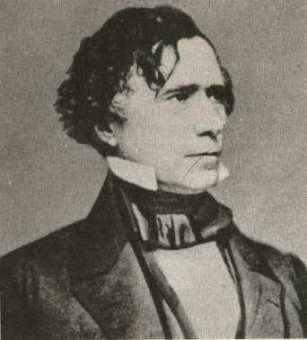 FRANKLIN PIERCE
FRANKLIN PIERCEwww.FranzosenbuschHeritageProject.org Home
 FRANKLIN PIERCE
FRANKLIN PIERCE
14TH PRESIDENT OF THE UNITED STATES
1853-1857
PIERCE, FRANKLIN (1804-69), 14th President of the United States (1853-57). Born in Hillsboro, New Hampshire, he graduated from Bowdoin College in 1824, studied law, and was admitted to the bar in 1827. Elected as a Jacksonian Democrat to the New Hampshire legislature in 1829, he served as speaker (1831-32) before leaving to enter the U.S. Congress in 1833. In 1834 he married Jane Means Appleton (1806-68), the daughter of the president of Bowdoin College.
Senator, Lawyer, and Soldier. After two terms in the House of Representatives, Pierce was elected to the Senate in 1836. His political opinions were conventional, but he was a strong advocate of national expansion and vigorously opposed the views of abolitionists on the slavery question.
In 1842 Pierce resigned his seat in the Senate. His wife, who had been in poor health, disliked life in Washington, and he found it difficult to support a growing family on a Senator's salary. He settled in Concord, New Hampshire., and resumed the practice of law. A forceful speaker, he was both handsome in appearance and affable in manner and made a popular addition to social and political gatherings. He achieved distinction as a lawyer and remained active in the local Democratic party as its campaign manager (1842-47). Refusing an appointment as U.S. Attorney General in 1846, he satisfied his intense nationalist feelings by volunteering for service in the Mexican War. He was appointed a colonel and was later promoted to brigadier general of volunteers. In 1847 he entered Vera Cruz, Mexico, with Gen. Winfield Scott, but because of illness he saw little action and resigned his commission at the end of the war. In 1852 the Democratic national convention was faced with such a badly split party that no single faction was able to nominate its candidate. Pierce, New Hampshire's favorite son, was then pushed forward by his backers as a suitable compromise candidate and went on to win the nomination on the 49th ballot.
The Presidency. Pierce made no speeches during the campaign. Since there were no real issues between the Democrats and the Whigs, the voters were faced with choosing Pierce or his chief opponent, General Scott, on the basis of personal characteristics and party loyalty. Although Pierce received a popular majority of less then 50,000 votes, he carried all but four states in the electoral college.
The new President had the ability to harmonize conflicting views, and his Cabinet appointments were designed to represent all sectional factions of the Democratic party. He pursued a vigorous foreign policy, but not always with success. An attempt to acquire Cuba ended embarrassingly in the Ostend Manifesto (1854), a notorious declaration by three American diplomats of America's alleged determination to seize the island. Great Britain was offended when William Walker, an American filibuster, seized Nicaragua and his government was recognized by the United States (1855). Pierce's efforts to obtain Hawaii and Alaska also failed. However, the Gadsden Purchase (1853) was negotiated with Mexico, and the mission of Commodore Matthew Perry, previously authorized by President Millard Fillmore, opened Japanese ports to trade.
The administration's domestic policy was dominated by the slavery issue. Pierce supported the Kansas-Nebraska Bill and after a bitter fight it was passed in 1854. It repealed the Missouri Compromise and substituted the doctrine of popular sovereignty on the question of extending slavery into the territories. The result was a state of civil war in Kansas. The President was condemned by many Northerners for appeasing the South, and he lost much of his popularity.
The Last Years. The Democrats passed over Pierce in their convention in 1856 and nominated James Buchanan. Sorely disappointed. Pierce traveled abroad for several years after retirement from office and then settled again in Concord, New Hampshire. He was politically inactive, but strongly opposed the Lincoln administration. An amiable man who tried honestly to be a conciliator, he unfortunately lacked the qualities of leadership needed for the time.
Consult Nichols, R. F., Franklin Pierce (1958).
JAMES P. SHENTON, Columbia University
For the history of our local settlers, see Early Settler History (1833 - 1850).
Source: Encyclopedia International, Grolier International, 1972.
Picture from the Encyclopedia International, Grolier International, 1972.
Last Modified: 06/01/2002